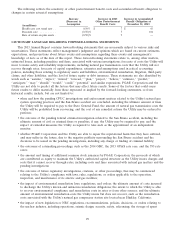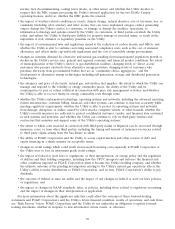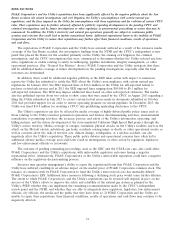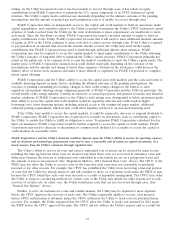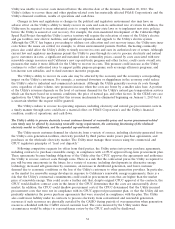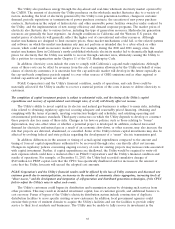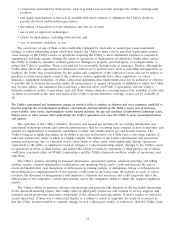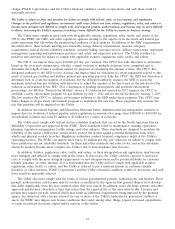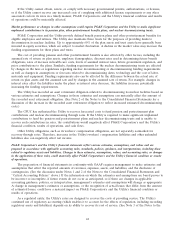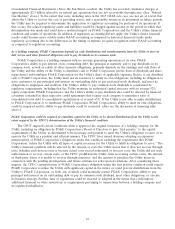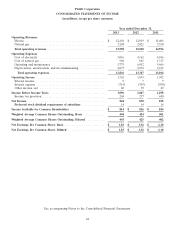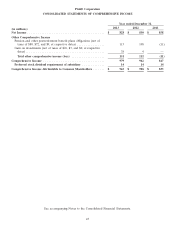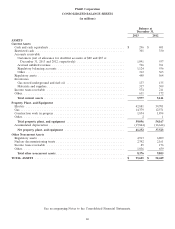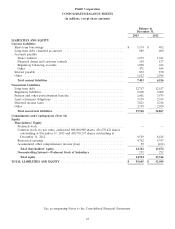PG&E 2013 Annual Report Download - page 45
Download and view the complete annual report
Please find page 45 of the 2013 PG&E annual report below. You can navigate through the pages in the report by either clicking on the pages listed below, or by using the keyword search tool below to find specific information within the annual report.of the Notes to the Consolidated Financial Statements.) The Utility’s ability to continue to operate its nuclear
generation facilities also is subject to the availability of adequate nuclear fuel supplies on terms that the CPUC will
find reasonable.
The NRC oversees the licensing, construction, and decommissioning of nuclear facilities and has broad authority
to impose requirements relating to the maintenance and operation of nuclear facilities; the storage, handling and
disposal of spent fuel; and the safety, radiological, environmental, and security aspects of nuclear facilities. The NRC
has adopted regulations that are intended to protect nuclear facilities, nuclear facility employees, and the public from
potential terrorist and other threats to the safety and security of nuclear operations, including threats posed by
radiological sabotage or cyber-attack. The Utility incurs substantial costs to comply with these regulations. In
addition, in March 2012, the NRC issued several orders to the owners of all U.S. operating nuclear reactors to
implement the highest-priority recommendations issued by the NRC’s task force to incorporate the lessons learned
from the March 2011 earthquake and tsunami that caused significant damage to the Fukushima-Dai-ichi nuclear
facilities in Japan. The NRC may issue further orders to implement the recommendations, including facility-specific
orders, which could require the Utility to incur additional costs.
In 2009, the Utility filed an application with the NRC to renew the operating licenses for the two operating units
at Diablo Canyon. (See ‘‘Regulatory Matters—Diablo Canyon Nuclear Power Plant’’ above.) In May 2011, after the
Fukushima-Dai-ichi event, the NRC granted the Utility’s request to delay processing the Utility’s application while
certain advanced seismic studies were completed. The Utility is currently assessing the data from recently completed
advanced seismic studies along with other available seismic data. The Utility will not make any decision about
whether to request that the NRC to resume processing the license renewal application until this assessment is
completed and provided to the NRC. The Utility anticipates that it will complete this assessment by June 2014. If the
Utility does not request that the NRC resume processing the application, the current operating licenses would expire
in 2024 and 2025. In any event, the NRC has stated that it will not issue final decisions in licensing or re-licensing
proceedings, including the Utility’s re-licensing application, until it has issued a new ‘‘waste confidence decision,’’ as
described below. In addition, the NRC would not issue renewed operating licenses for Diablo Canyon unless the
California Coastal Commission determined that license renewal is consistent with federal and state coastal laws.
In the NRC’s original ‘‘waste confidence decision,’’ the NRC found that spent nuclear fuel can be safely
managed until a permanent off-site repository is established. The NRC’s waste confidence decision was successfully
challenged on the basis that the NRC’s environmental review was deficient. The NRC has instructed its staff to
develop and issue a new waste confidence decision and temporary storage rule by October 2014. It is uncertain how
the new waste confidence decision and temporary storage rule would affect the Utility’s decision to resume the
renewal application process at the NRC or, if the application process were resumed, how the new waste confidence
decision and temporary storage rule would affect the disposition of the renewal application. It is also uncertain how
the new waste confidence decision and temporary storage rule would affect the Utility’s nuclear generation
operations during the current terms of the NRC licenses for Diablo Canyon.
The CPUC has authority to determine the rates the Utility can collect to recover its nuclear fuel, operating,
maintenance, compliance, and decommissioning costs. The Utility also could incur significant expense to comply with
regulations or orders the NRC may issue in the future to impose new safety requirements, to obtain license renewal,
and to comply with federal and state policies and regulations applicable to the use of cooling water intake systems at
generation facilities, such as Diablo Canyon. (See ‘‘Environmental Matters’’ above.) The Utility expects that it would
seek rate recovery of these additional costs. The outcome of these rate proceedings at the CPUC can be influenced
by public and political opposition to nuclear power.
If the Utility were unable to recover costs related to its nuclear facilities, PG&E Corporation’s and the Utility’s
financial condition, results of operations, and cash flows could be materially affected. The Utility may determine that
it cannot comply with the new regulations or orders, including a new waste confidence decision, in a feasible and
economic manner and voluntarily cease operations at Diablo Canyon. Alternatively, the NRC may order the Utility
to cease its nuclear operations until it can comply with new regulations, orders, or decisions. Further, the Utility
could decide not to resume the license renewal process or the Utility could fail to obtain renewed operating licenses
for Diablo Canyon requiring nuclear operations to cease when the current licenses expire in 2024 and 2025.
The Utility’s operations are subject to extensive environmental laws and changes in or liabilities under these laws could
adversely affect PG&E Corporation’s and the Utility’s financial conditions, results of operations, and cash flows.
The Utility’s operations are subject to extensive federal, state, and local environmental laws, regulations, orders,
relating to air quality, water quality and usage, remediation of hazardous wastes, and the protection and conservation
39


